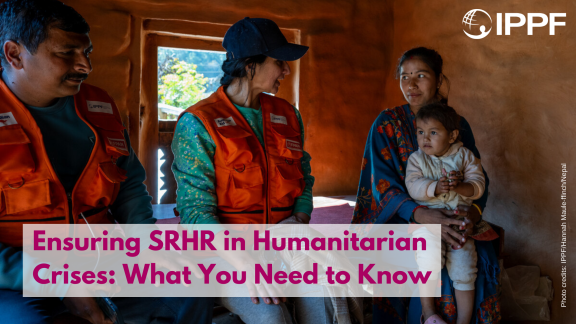Read more about IPPF’s humanitarian work here.
Over the past two decades, global forced displacement has consistently increased, affecting an estimated 114 million people as of mid-2023. Over half were women and girls, and in some emergencies, they made up nearly 90 per cent of the population. When a crisis strikes, women and girls are disproportionately disadvantaged and less prepared or empowered to survive or recover. Disasters reinforce, perpetuate, and increase gender inequality, making bad situations worse for women.
What are the consequences of humanitarian crises on SRH needs and services?
The daily life processes continue to occur in an emergency. Sex does not stop in an emergency. Pregnancy does not stop in an emergency. Birth does not stop in an emergency. SRH is what women ask for in emergencies. Sexual & reproductive healthcare is a normal part of health provision.
Neglecting lifesaving SRH care in humanitarian settings has serious consequences: preventable maternal and new-born deaths; sexual violence and subsequent trauma; sexually transmitted infections; unwanted pregnancies and unsafe abortions; and the possible spread of HIV. Many women and couples wish to space or limit pregnancies following displacement; the need for contraception increases after an emergency. Women in humanitarian emergency settings face increased risk of unintended pregnancies; they are at a greater risk of sexual violence, including rape.
The collapse of health systems means reduced access to both contraceptives and safe abortion and post abortion care (treatment for complications of unsafe abortion). Abortion is included as an additional priority area in the Minimum Initial Service Package (MISP), a series of crucial actions required to respond to reproductive health needs at the onset of every humanitarian crisis. Professionals can provide safe abortions even in acute emergency settings and in settings without electricity or running water.
Photo credits: IPPF/Hannah Maule-ffinch/Nepal

What are IPPF’s partners roles in humanitarian settings?
Due to our global network of local organisations – covering over 170 countries worldwide - we are one of the few organisations that are there before, during and after a crisis. 8 out of 10 people receiving IPPF services worldwide are classified as poor and vulnerable. Our Member Associations work in acute, protracted, natural and man-made disasters all around the world, and have done so for decades. Often, we are the only provider of SRH in emergency settings and in 2023, IPPF delivered critical sexual and reproductive health services to over 13 million crisis affected people globally.
In emergencies we reach communities that have little to no access to SRH even in stable times, creating an opportunity for women to access much needed and wanted SRH, especially contraceptives. Engagement of vulnerable and marginalized communities is central to the design, delivery and evaluation of our humanitarian interventions. We focus on reaching the most marginalized and underserved women and girls first, and other marginalised groups such as the LGBTIQ+ community, People Living with HIV (PLHIV) and people with disabilities.
Photo credits: PFPPA/Palestine

What more needs to be done?
As crises worldwide, both manmade and natural, increase in intensity and frequency every year, our humanitarian work and impact has grown too. We continue to build on the capacity of our local partners to respond to emergencies in a timely and quality way. Our focus is on locally led humanitarian action, supported by the IPPF Secretariat. Funding for crises, and sexual and reproductive healthcare, is at risk, and we call on donor to prioritise this often-overlooked aspect of humanitarian aid. As a proudly anti-colonial and anti-racist organisation, we will continue to call out and acknowledge the driving force behind many of the world’s conflicts. We are also committed to being a feminist humanitarian organisation and drawing on our long history as an inclusive and feminist organisation by applying these principles to our humanitarian work.
Photo credits: IPPF/Record Media/Yemen

when
Subject
Humanitarian









